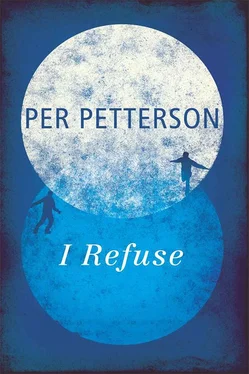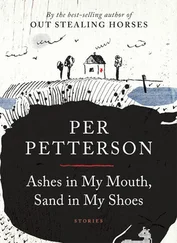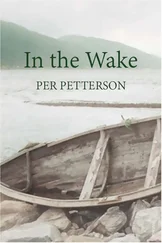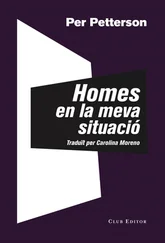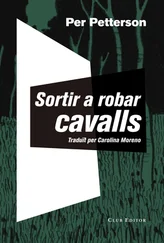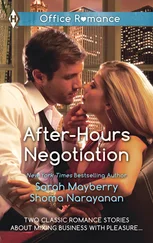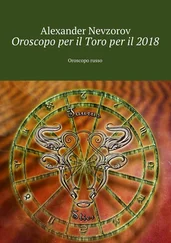I took the escalator down and walked to the nearest swing doors and past the sign on the wall that said: Social Security 2nd Floor, by a stairwell with a glass door and a lift on the inside, and out into the high street. I stopped on the pavement. The railway station and the bus terminal were to the left down the long street and round the bend by the Art Centre, but I couldn’t see them from here. To the right, behind the shopping centre, was my car, by the building which I also couldn’t see, that no longer had a Wine Monopoly on the ground floor but a horror restaurant. I didn’t know where the Wine Monopoly was now, but I was certain they still had one here in Lillestrøm. You bet they did. It was chilly. The raw autumn air stole down the street from the Nitelva river and the big lake. It was as it had always been, it was always a little colder in Lillestrøm, and in the winter it was really bad when damp, icy, air clung to your skin and burned, I could remember it all too well. And on this September day it wasn’t any different. I put on my coat and buttoned it to the very top. I looked right and left, looked up the street, looked down, and my eyes found nothing to settle on. I didn’t know where the hell to go.
I stood still. I couldn’t take the first step. A woman came out of the swing doors behind me. I couldn’t see her, but the strong scent of her perfume hit me in the back of my head, and I must have been standing in her way as she came out, for she knocked into me with such force it almost sent me flying, it happened so suddenly.
‘What the hell,’ I said aloud.
‘Shift yourself,’ she said sharply into my ear, she was chewing gum, I was a dog, there wasn’t anything I couldn’t scent. I was sure she would look terrible, and I turned to see that I was right, but I was dead wrong. She looked great, but in a harsh way, a made-up, slightly scornful way, and I knew the type, they didn’t come from Oslo, they came from the country, I grew up among them, and I knew them so well, they gave me a feeling of comfort and safety.
I put my hands on my hips and said:
‘For Christ’s sake, calm down.’
‘The hell I will,’ she said. ‘You were in my way.’ She was so self-confident, so provocative.
‘I guess maybe I was,’ I said, and then I had to laugh. ‘Sorry,’ I said.
‘No need to be,’ she said. ‘It’s just that the door hit me, and it hurt like hell, right here,’ she said, and slapped her bottom, and then she said: ‘That’s quite a coat, that is. It’s got style.’
‘Thank you,’ I said, and she leaned over and kissed me on the forehead, and it didn’t surprise me at all. ‘Have a lovely day,’ she laughed, in a husky way, and that too was as it should be.
‘The same to you,’ I said, and she left, and I watched her as she walked away. I took my handkerchief from my pocket and wiped my forehead. That was some kiss. When she was halfway down the high street on her way to the station, she turned and waved. I raised my hand. Then I walked back in through the swing doors and took the escalator up to Level 2.
In the gallery, I walked past the boutiques, not even looking at the signs and the names they displayed, and stopped right on the shiny track set in the floor between the gallery and the café, where you could pull a wide security grille across when the café was closed, so that no one could get in and make mayhem and steal, and now there were three people queuing at the counter. They had trays with piles of food, it was going to be a while, and even more customers might come to have dinner, not lunch, but I just stood waiting. And I didn’t really think anything. I just stood there. I didn’t know what I had imagined. That she would come out from behind the counter, take off her apron and walk up to me. Move towards me, like in a film. That even after Jim and my father still something new would happen on this day, as if it were a mark in time.
Her eyes were restless, I thought. She glanced back and forth between the trays and the keys of the cash desk and rang up the totals so quickly you could hardly see her fingers move, and she didn’t look up until she had finished with the three customers who had been standing in the queue and were hungry and then one more who had joined them in the meantime, and was now on his way to his table by the windows, and this time there was no table service, they had to carry the trays themselves.
She looked up and saw me at once. I stood where I stood. I didn’t take one step. Another customer came in with a tray in his hands, I could see he just wanted a vanilla slice and a coffee, but she leaned towards him across the counter and said something and smiled, and he was polite and smiled back and put his tray down, and then she turned the till key and put it in her apron pocket and came out from behind the counter towards me. That made me a little nervous, for I knew she was unhappy about something I had said or not said and then it had gone wrong, if something can go wrong between two people who have known each other for ten minutes, and now I was tormenting her by coming back up here, and she was forced to come over to say she couldn’t put up with this, I had to leave. I could leave, if it came to that. And then she stopped in front of me. She looked me straight in the eye, her head tilted to one side and then to the other. She waited. It made me feel awkward. And then she took a risk, I am sure that’s what she was thinking, I’ll just say it, she thought, come what may, and she said:
‘Can you wait for half an hour.’
‘Yes,’ I said.
‘Good.’
She turned and walked back to the counter, opened the till with the key and rang up the vanilla slice and one coffee, and what I noticed was that she rang up the total much slower than she’d done before.
I started to walk along the gallery. A wave of heat washed through me. As if I’d just made my first parachute jump. And survived.
TOMMY ⋅ AFTERNOON ⋅ SEPTEMBER 2006
IT WAS A long half an hour. I spent most of it in the bookshop on Level 1 in Lillestrøm Shopping Centre. It had a window facing the marketplace and the bandstand, but there was no music, nor any market trading to speak of, now in September. It was cloudy out where my father lived, but here the sunlight was flooding the marketplace in an unreal yellow, and yet the tarmac looked strangely frozen, almost blue, underneath. A woman walked past holding a carrier bag. On it was the logo for Match with a red triangle in the top of the M. She was wearing a woollen cap and gloves, but it really wasn’t that cold.
In the bookshop I found nothing of interest. All the new fiction, I didn’t know any of the authors’ names, and on two long tables there were three stacks of fat crime books next to each other, most of them Norwegian, and I hadn’t heard of these authors either, apart from maybe a couple of them, who were selling sensationally well, I had seen them in the newspaper, they were given a full-page spread on the arts pages in Dagbladet , and in the financial section at the back, because they earned serious money, but actually I didn’t much like crime novels. I had read Raymond Chandler’s books many years ago, but I don’t think it was because it was thrilling to work out who killed whom with knives, bullets and blunt instruments. What I liked was the main character, the private detective Philip Marlowe. I don’t know why, but he touched me in a way I hadn’t expected of a crime novel. There was something about him. A dignity, perhaps, an incorruptibility I didn’t feel I had myself, although I might have had it once. There was especially one book: The Long Goodbye , it made me feel upset, almost desperate when I had finished it. There were seven novels about Philip Marlowe, and after I had read them all I didn’t go any further. I was sure no other crime novel existed that could move me in the way Raymond Chandler’s books about Philip Marlowe had. And that was the only thing I was interested in at the time. It was many years ago. I had barely read a book since, that wasn’t non-fiction. I had put it behind me. I didn’t have time to be moved. What I decided was to let things take their course and think no more about it.
Читать дальше
